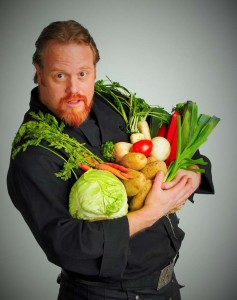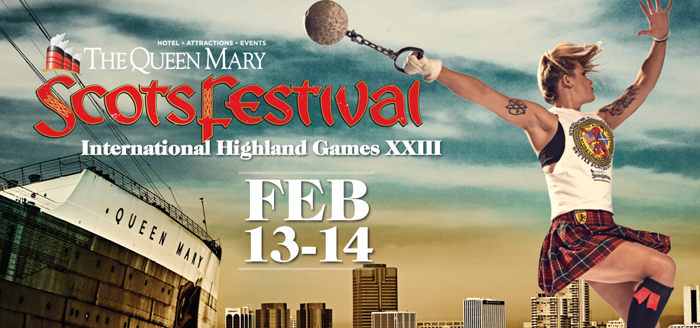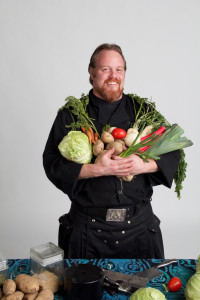Chef Eric McBride brings his Celtic Cuisine passion and award-winning expertise to The Queen Mary ScotsFestival and International Highland Games this weekend (February 13-14). I’m headed to ScotsFestival this weekend and can’t wait to sample this delicious cuisine and learn more about Chef McBride’s recipes!

As noted in his biography, To say that Chef Eric W. McBride is passionate about Celtic Food and its culture is a bit of an understatement. Classically educated in Celtic History and Literature and with more than 30 years of experience in the food industry; his experiences have taken him across four continents and twenty countries. At one point he found himself the head Maitre d’ for Princess Ann of Great Britain, engagement party. His unique knowledge of the almost forgotten field of Celtic Cuisine has possessed him to bring these remarkable dishes back into the fold, and find their places amongst the dinner tables of the 21st century.
I was fortunate to interview Chef Eric McBride and learn some basics about Celtic Cuisine.
Interview with Chef Eric McBride
1. The name McBride appears to be Celtic in origin. Did you grow up in a family that prepared any traditional Celtic dishes (old family recipes, etc.) and did this influence your career choice?
Even though my family was in the Food Services Industry, they did not know that many of the family dishes I grew up on (from both sides of my family) were Celtic. In fact the labeling of “Celtic Cuisine” has only come about in the last 10 years.
2. What is traditional Celtic cuisine?
Today there are 8 distinctly different lands, which can still be called Celtic. These lands are Scotland, Ireland, Manx, Wales, Cornwall, Brittany France, Galicia and Asturias Spain.
As the remnants of what was once the great expanse of the Celtic Culture came to terms with their new homes they adapted their diet to food readily available to them. Much of what can be called Celtic Cuisine is divided between that which comes from the colder waters of the northern climates and seas and those products that could be farmed in very rugged terrain. The vegetables were primarily grown from rocky and less desirable soil and sometimes in somewhat higher altitudes. These types of vegetables in the northern countries did not need as much light but stored large quantities of energy in complex carbohydrates and starches.
3. Noting your Celtic history education background, what types of major factors (environmental, cultural, history, etc.) influenced the composition and evolution of Celtic cuisine?
Many aspects of Celtic Cuisine are a direct aspect of historical influences. In Scotland they have a love affair with oranges, yet no orange trees grow there. For centuries it was the fruit cherished by the nobility that could afford to import them. During the Napoleonic era, the British Army under the Command of an Irishman (The Duke of Wellington) fought a campaign for 7 years in Spain. One third of Wellington’s army was from Scotland. During that time the Scots got used to having oranges for breakfast everyday since oranges are abundant in Spain. A score or so years after the war the age of steam arrives and suddenly oranges are available and all over Scotland thousand of Veterans remember the good old Army days of eating oranges. Today the national soda pop of Scotland is Irn-Bru, which is an orange cream soda.
4. What are the most common herbs or spices used in Celtic cuisine?
There are 5 primary herbs used in ALL 8 Celtic nations, they are parsley sage, rosemary, thyme and tarragon. The two primary spices used in the Northern 6 Celtic nations are mustard seed and horseradish. Thyme is the number one herb. It is so abundant that you can find it growing on the side of the road in any of the 8 nations.
5. You offer some wonderful looking Celtic cookbooks and spice blends. Please tell the readers about them and where they can purchase them.
I have 4 Celtic Cookbooks—Book I Scottish Cuisine, Book II Irish cuisine, Book III Wales & the isle of Manx, and a Celtic-style Vegetarian Cook book. All of them I have won awards in Top Chef Charity competitions in Denver, Dallas, & Las Vegas. My spice line is currently 6 in number. All of these you can come out to the Queen Mary’s ScotsFestival and get a signed copy or on either my website www.celticcaterer.com or my Facebook page “The Celtic Caterer & Chef Eric W. McBride.” If you have any trouble with these you can email me direct at celticcaterer@hotmail.com
6. What events are you supporting at this year’s ScotsFestival and what dishes will you be preparing?
I will be doing 7 live Celtic cooking demonstrations at The Queen Mary’s ScotsFestival. These are the times and dishes that I will be doing:
SATURDAY
11:00 am: Welsh Tomato Rarebit
1:00 pm: Cock-a-Leekie Soup
2:30 pm: Irish Asparagus Blue Salad
4:00 pm: Scottish Orange Chocolate Whisky Mousse
SUNDAY
11:00 am: Dublin Coddle (Sausage & Bacon stew)
1:00 pm: Welsh Cauliflower Mustard Whisky Cheese soup
3:00 pm: Scottish Sticky Toffee w/ Candied Bacon
7. What is one of your favorite dishes that incorporates beer in the recipe? Same question for Irish whiskey or Scotch.
I do a lot of cooking with Guinness but some recipes call for a different type of Ale. As far as cooking with whisky there is a bell curve for the best results. Irish whiskey, which is distilled 3 or more times, is great for drinking but is too delicate to survive flavor-wise when exposed to heat. The same thing goes for the peaty flavored Scotches but here they are too expensive to be economical to cook with. This is very similar to cheese—the milder flavors cannot survive exposure to heat and still taste like cheese. You need a very mature flavored cheese to bake with. The hierarchy of cooking with whisky starts with Irish whiskey on one side then followed by Canadian whisky, rye, bourbon, sour mash, Scotch blended, Scotch single malt, Island Single Malt Scotch Whisky. The best three are bourbon, sour mash, and my favorite, blended Scotch.
8. Any recommendations for pairing Celtic cuisine and beer or Celtic cuisine and Irish whiskey or Scotch?
Gastronomy, or the paring of foods with drink, really depends on what the dish is made with. If cooked with grains/oats then for the most part whisky is best. Other dishes like a Welsh rarebit, or Irish stew, then a good ale is in order.
Thank you Chef McBride for your time and some great insight into Celtic Cuisine!
If you want to hear more from Chef Eric McBride before this weekend, he will be appearing on the KTLA morning show of February 11 and on CBS LA for the noon news show on Friday February 12.
More importantly, you definitely want to see Chef Eric McBride prepare some delicious Celtic dishes at The Queen Mary ScotsFestival and Highland Games this coming weekend.


Let’s go!!
I’ll be there. Join me!